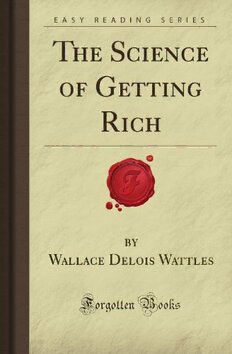Download The Science of Getting Rich (Forgotten Books) PDF Free - Full Version
Download The Science of Getting Rich (Forgotten Books) by Wallace Delois Wattles in PDF format completely FREE. No registration required, no payment needed. Get instant access to this valuable resource on PDFdrive.to!
About The Science of Getting Rich (Forgotten Books)
This little 'prosperity consciousness' book has been cited by the author of the bestselling The Secret as a primary source. Fairly typical of the period literature on this belief system, it remains to be seen whether the modern version of this has anything new to say which hasn't been said here, and in many other books. (Quote from sacred-texts.com)About the AuthorWallace Delois Wattles (1860 - 1911)Wallace Delois Wattles (1860 - 1911) was an American author. A pioneer success writer, he remains personally somewhat obscure, but his writing has been widely popular in the New Thought and self-help movements.Wattles' best known work is a 1910 book called The Science of Getting Rich in which he explained how to become wealthy. He claimed to have personally "tested" the principles he described and they apparently worked, for although he had lived most of his life in poverty, in his later years he was a prosperous man.What little is known about Wattles' life comes from the text of a letter his daughter Florence wrote after his death to the New Thought author Elizabeth Towne. (Towne was the editor of the secular New Thought magazine Nautilus and had published many articles by Wattles from the magazine's founding in 1898 until Wattles' death in 1911.) From Florence's letter, one learns that Wattles was born in the United States shortly before the American Civil War, experienced much failure in his earlier years, and later in life began to study the various religious beliefs and philosophies of the world, including those of Descartes, Spinoza, Gottfried Leibniz, Schopenhauer, Hegel, Swedenborg, Ralph Waldo Emerson, and others.The most direct influence on Wattles' thinking, outside of the books he read, came in 1896 in Chicago, when
Detailed Information
| Author: | Wallace Delois Wattles |
|---|---|
| Publication Year: | 2008 |
| ISBN: | 9781605069241 |
| Pages: | 64 |
| Language: | English |
| File Size: | 0.372 |
| Format: | |
| Price: | FREE |
Safe & Secure Download - No registration required
Why Choose PDFdrive for Your Free The Science of Getting Rich (Forgotten Books) Download?
- 100% Free: No hidden fees or subscriptions required for one book every day.
- No Registration: Immediate access is available without creating accounts for one book every day.
- Safe and Secure: Clean downloads without malware or viruses
- Multiple Formats: PDF, MOBI, Mpub,... optimized for all devices
- Educational Resource: Supporting knowledge sharing and learning
Frequently Asked Questions
Is it really free to download The Science of Getting Rich (Forgotten Books) PDF?
Yes, on https://PDFdrive.to you can download The Science of Getting Rich (Forgotten Books) by Wallace Delois Wattles completely free. We don't require any payment, subscription, or registration to access this PDF file. For 3 books every day.
How can I read The Science of Getting Rich (Forgotten Books) on my mobile device?
After downloading The Science of Getting Rich (Forgotten Books) PDF, you can open it with any PDF reader app on your phone or tablet. We recommend using Adobe Acrobat Reader, Apple Books, or Google Play Books for the best reading experience.
Is this the full version of The Science of Getting Rich (Forgotten Books)?
Yes, this is the complete PDF version of The Science of Getting Rich (Forgotten Books) by Wallace Delois Wattles. You will be able to read the entire content as in the printed version without missing any pages.
Is it legal to download The Science of Getting Rich (Forgotten Books) PDF for free?
https://PDFdrive.to provides links to free educational resources available online. We do not store any files on our servers. Please be aware of copyright laws in your country before downloading.
The materials shared are intended for research, educational, and personal use in accordance with fair use principles.

